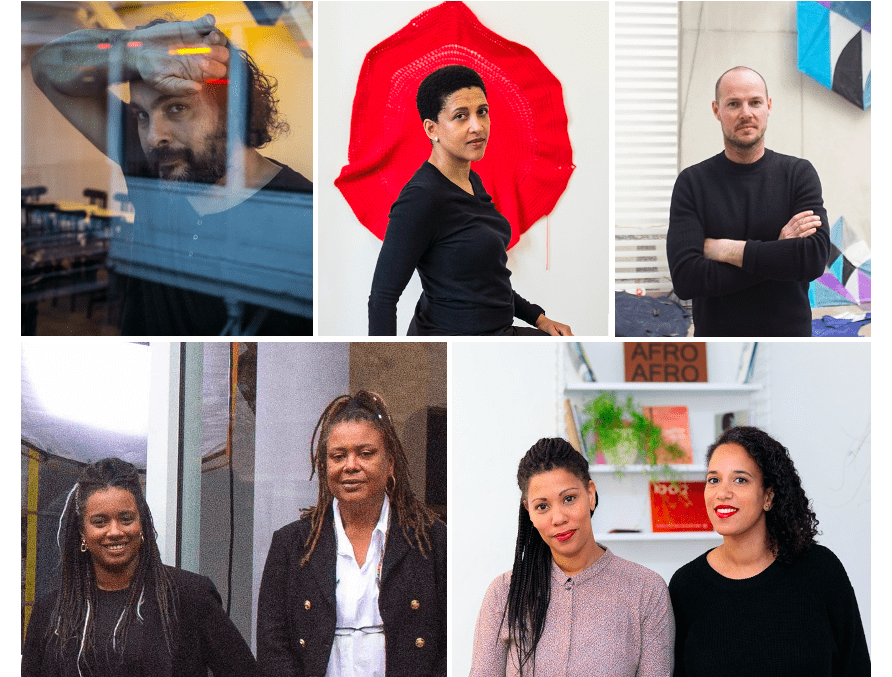Kader Attia, Lerato Shadi, Raul Walch, Yvette Mutumba & Julia Grosse, Nadja Ofuatey-Alazard & Anna Yeboah are the jury of this year’s Dekoloniale residency.

The members of the Dekoloniale Jury are: (clockwise) Kader Attia, Lerato Shadi, Raul Walch, Yvette Mutumba & Julia Grosse for C&. Photo: Benjamin Renter, Nadja Ofuatey-Alazard & Anna Yeboah for Dekoloniale ©selflovetribute
We are so excited to announce the members of our Dekoloniale Jury: Kader Attia, Lerato Shadi, Raul Walch, Yvette Mutumba & Julia Grosse for C&, Nadja Ofuatey-Alazard & Anna Yeboah for Dekoloniale.
In the coming weeks, the jury will make a decision on who will get the opportunity to co-create an artistic intervention as a resident of the Dekoloniale Berlin Residency 2021. The selected residents are invited to uncover and transform the historical colonial stratifications and dominant narratives in Berlin’s public space as well as traces of its preceding histories of involvement in the European trade of enslaved Africans. We are really looking forward to present our new residents to you soon!
We would also like to thank you for all the numerous proposals and applications, that have reached us over the past few weeks and let you know that we greatly appreciate your interest. – Stay tuned!
The two Dekoloniale Berlin residents are expected to co-create an artistic intervention in the public sphere – this year’s sites of reference are:
1 Treptower Park, Carp Pond
The 88.2-hectare Treptower park was laid out in 1876–88. In 1896, the First Colonial Exhibition opened here. The artificial Karpfenteich (carp pond), initially created for fish breeding, became the exhibition’s infamous scenery. Treptower Park is one of four Berlin parks to have survived from the 19th century. At the end of the twentieth century, extensive conservation work was carried out and the park was historically reconstructed in parts, leaving out any traces commemorating these early events. Today Treptower Park, with its river landscape, huge meadows, and tranquil areas, is very popular for recreational uses of all kinds.
2 Schloss Friedrichsfelde and Tierpark
The Schloss Friedrichsfelde is a neoclassical-style palace in the center of Berlin’s Tierpark (zoo), built in the Friedrichsfelde district in 1685 by Benjamin Raule, a Dutch shipowner in charge of the early Brandenburg enslavement trade. The Great Elector Frederick William I of Brandenburg conferred the plot of Schloss Friedrichsfelde on Raule in 1682 for his ‘services’ as part of the Kurbrandenburg Navy, namely founding a company involved in the abduction of enslaved African people. With the income thus generated, Raule financed the construction of a small zoo on his estate, today’s renowned Tierpark Friedrichfelde. In 2020, the zoo opened its newly designed large animal enclosure with a backdrop of stereotypical huts that it says are supposed to provide “authentic glimpses of a spacious Savannah landscape” under the title ‘Off to Africa’.
Kader Attia is an artist who explores the wide-ranging effects of western cultural hegemony and colonialism. Central to his inquiry are the concepts of injury and repair, which he uses to connect diverse bodies of knowledge, including architecture, music, psychoanalysis, medical science, and traditional healing and spiritual beliefs. Throughout his multimedia practice—ranging from sculpture to film installation—reparation does not mark a return to an intact state, but instead makes visible the immaterial scars of psychic injury. This approach is informed by Attia’s experience of growing up between Algeria and the Paris banlieues.
Lerato Shadi (born in Mahikeng, South Africa) lives in Berlin. Her work has been shown internationally, most recently in two solo shows at KINDL in Berlin (2020/2021) and at Kunstverein in Hamburg (July 2020); in numerous group exhibitions i.e., at the Musée d’Art Moderne de Paris and Musée national de l’histoire de l’immigration (both 2021), the 14th Curitiba Biennial in Brasil (2019), Kunsthal KAdE Amersfoort and the Zeitz Museum of Contemporary Art Africa in Cape Town (both 2018) as well as in the public program The Parliament of Bodies at the documenta 14 in Kassel (2017).
Raul Walch is a visual artist living and working in Berlin. He studied sculpture at the Kunsthochschule Berlin-Weißensee and completed his studies in Olafur Eliasson’s class at University of the Arts Berlin. Subsequently, he was a fellow at the Institut für Raumexperimente. Walch is a board member of the initiative Die Vielen e.V. and the Berlin artists’ association, bbk berlin. Currently he is teaching at the international MFA-Program “Public Art and New Artistic Strategies” at Bauhaus-Universität Weimar and recently initiated the exhibition project www.ownedbyothers.org
Yvette Mutumba was part of the curatorial team of the 10th Berlin Biennale for Contemporary Art and Visiting Professor for « Global Discourses » at the Academy of Media Arts Cologne (2017-2018). Currently she is Curator-at-Large at the Stedelijk Museum, Amsterdam. Julia Grosse is a book author and worked as a columnist and arts journalist in London for the Tageszeitung (taz), frankfurter Allgemeine Sonntagszeitung (FAS), Architectural Digest, and the Süddeutsche Zeitung. Together, Grosse and Mutumba are co-founders and chief editors of the art magazine Contemporary And (C&), and lecturers at the Institute of the Arts in berlin. In 2020 Julia Grosse and Yvette Mutumba were awarded « European Cultural Manager of the Year ».
Nadja Ofuatey-Alazard is an African-German editor curator, activist and public intellectual, whose work practice revolves around the visbility, the acknowledgement and the historical contextualisation of populations of African decent and their intellectual and artistic practices and contributions. She works as co-CEO and artistic director of the Black empowerment/advocacy platform, community-/arts center and library Each One Teach One (EOTO) in Berlin.
Anna Yeboah is an architect and curator. Her research and artistic practice revolves around systems of power in architecture and urban space with a focus on decolonial spatial strategies. Anna is a lecturer at the Berlin University of Fine Arts and is a frequent contributor to ARCH+.
More Editorial